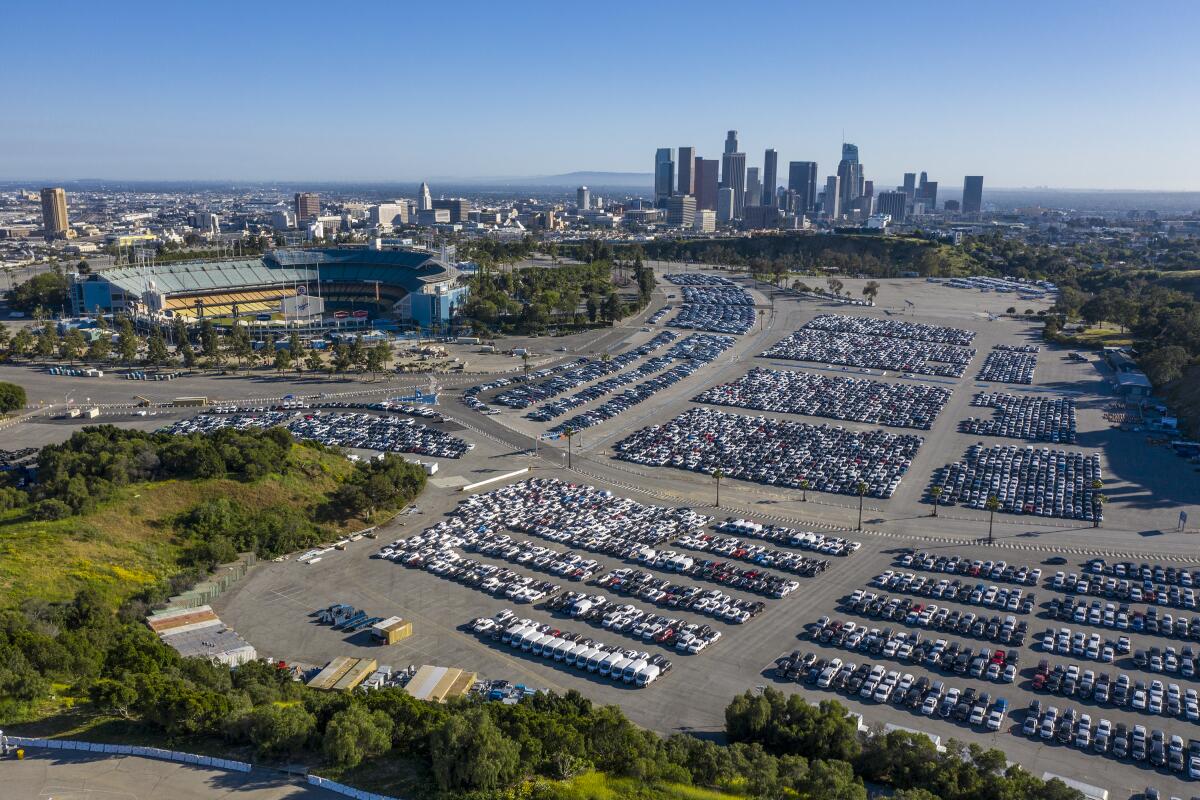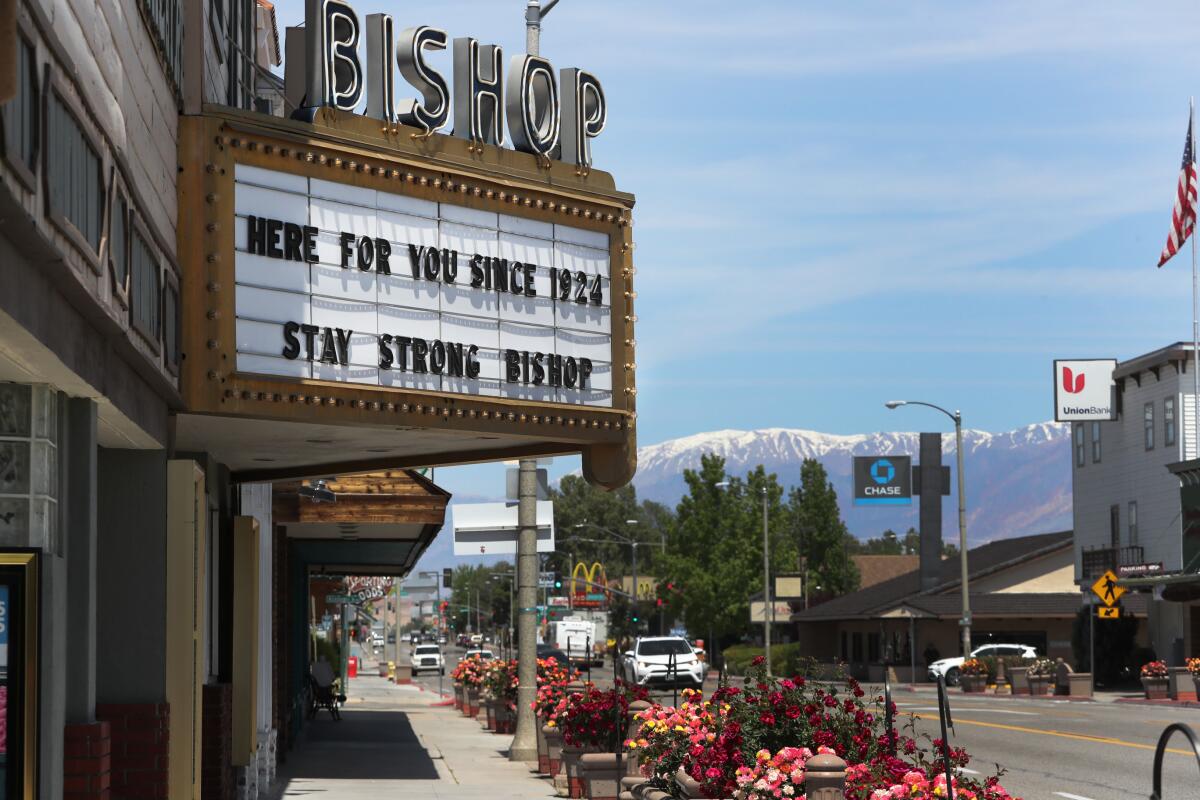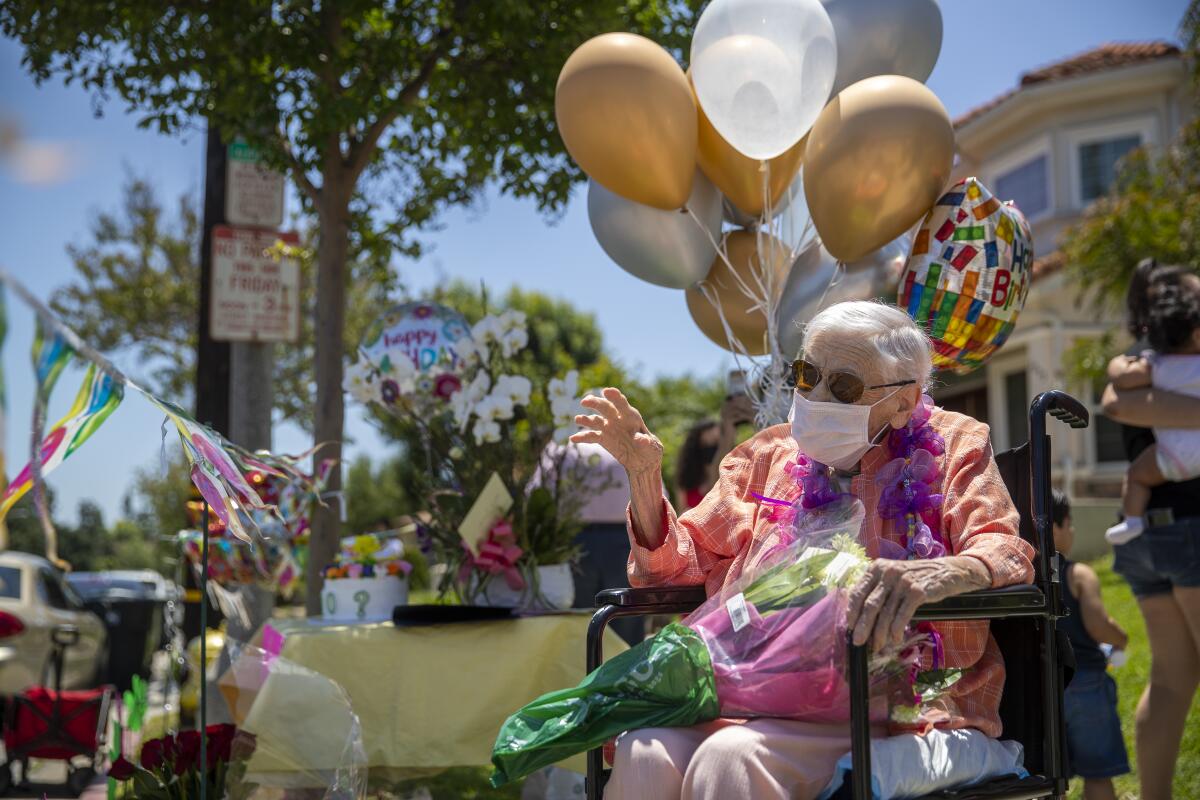Coronavirus Today: Where’s America’s shared grief?
Good evening. We’re Diya Chacko and Sam Schulz, and it’s Friday, May 22. Here’s the latest on what’s happening with the coronavirus, plus ways to spend your weekend and a look at some of the week’s best stories. We’ll be off Monday for the holiday, so the next edition of Coronavirus Today will be in your inbox Tuesday.
Bagpipes. Televised memorials. Presidential tributes to the dead. In the wake of national catastrophes like the Challenger explosion in 1986 and the terrorist attacks of Sept. 11, 2001, the United States mourned together. Yet this Memorial Day weekend, as the nation approaches 100,000 deaths from COVID-19, Americans don’t seem to be uniting in grief or purpose. “I don’t think we’re taking this in,” said David Kessler, an author of six books on grief. “We aren’t seeing 90,000 caskets. That kind of stuff would shock us. Maybe this is too big for us to comprehend.”
Complicating the ways Americans process grief are the restrictions on hospital visits, funerals and even hugs from caregivers. Hundreds of thousands of bereaved family members and friends have been robbed of the communal support and rituals that would normally help them cope with loss, and they’re struggling with guilt over all that they couldn’t do in their loved ones’ final days. “Everything just feels fake,” said one woman who lost her brother-in-law. “It doesn’t feel real because everything has been so different.”
The carnage is hitting Americans unevenly, and President Trump is both stoking the politically polarized response and counting on a fragmented experience to distract from a death toll that’s nearly triple that of any other country. On Friday, he demanded that governors let churches reopen immediately, in a surprise announcement aimed at a core element of his base whose support for him had flagged recently. (Gov. Gavin Newsom promised to provide plans Monday.) And as the White House said Friday that it was concerned about the virus’ spread in Los Angeles, the Trump administration also warned Mayor Eric Garcetti against “heavy-handed” stay-at-home orders.
Some of the people who’ve been hit hardest by the coronavirus are workers like Lopez, a Bay Area medical maintenance technician who works in hospitals that treat COVID-19 patients, has diabetes and lives in the U.S. illegally. With bills to pay, a family to support and no help from federal pandemic relief efforts because of his immigration status, he and millions of migrant workers face a wrenching choice: accept financial ruin or risk their health — and perhaps their lives.
The temporary reprieve granted by some of those relief programs is about to come to an end. As states begin to reopen and moratoriums on utility shut-offs end, a wave of utility bills coming due not only will saddle struggling people with new debt, but also could drive up utility rates for everyone. And the $900 million Congress provided to help low-income households pay those bills won’t be nearly enough, experts say.
In California, an effort to ease the economic burden on seniors by employing out-of-work restaurant workers to provide them free meals has fallen short of its lofty goal. When Gov. Gavin Newsom announced the initiative, he said “the universe of those eligible is certainly in the millions.” Nearly a month later, it had served only 16,377 seniors. Local leaders say delayed information from the state, the duplication of existing services and questions about reimbursement have hampered it.
In Los Angeles County, another effort has fallen short: A month after vowing to test all nursing home residents and staff, health officials have done so in only about a third of such facilities and have dramatically scaled back their plans for the rest. They’re now calling for testing only a small sample of residents in nursing homes that have not had an outbreak. Some experts fear the move could lead to more deaths in a vulnerable population by letting the virus spread undetected.
Despite these and other challenges, L.A. County has made some progress in slowing the spread. The holiday weekend will test whether it can sustain that progress, particularly as a heat wave lures people to the coast.
By the numbers
California cases and deaths as of 4:04 p.m. PDT Friday:

Track the latest numbers and how they break down in California with our graphics.
What to read this weekend
The county said yes. The state said no. A pancake house opened anyway. It’s a snapshot of how some business owners are defying official orders by opening their doors as they weigh their financial desperation against the health of themselves and their employees.
The unexpected danger zone on Pennsylvania Avenue. “Reporters are expected to work in dangerous places,” writes Times politics reporter Noah Bierman. “I just never figured the White House to be among them.”
Dodger Stadium is empty, but its parking lot isn’t. As travel has ground to a near halt, rental car companies have parked hundreds of thousands of unused vehicles in the lots of places like Dodger Stadium, Angel Stadium and Santa Anita racetrack. Times photographer Robert Gauthier captured their strangely orderly appearance in these eerie aerial photos.

You cured a deadly disease — and now you’re afflicted by fame. The person or people who create the first vaccine to halt the COVID-19 pandemic could spark the sort of fascination and adoration reserved for a musician, athlete or actor. If so, there are lessons to be learned from the fate of Jonas Salk, one of the creators of the polio vaccine.
No sports, no bars. So what’s a sports bar to do? Many sports bars across California have closed, permanently or otherwise, during the pandemic. But Kelly’s Korner Tavern in Placentia remains open, in large part because it has a secret weapon: honest-to-goodness delicious bar food.
“I’m the bouncy house guy, for Chrissakes.” Without work, Jim Edmonds, like many others, is fighting through empty and anxious days. Fear, boredom and a need to do something amid the collapse of his decade-old business — renting out inflatable jump houses — led him to an unauthorized protest at the state Capitol.
Pulling dollar bills off the wall to get by. Rodeo and fishing season is a time of year that many rural towns in the Owens Valley usually celebrate. But the virus that locals have come to call “The Big Weird” has shut down tourism to some of California’s most isolated spots.

Your support helps us deliver the news that matters most.
What to do this weekend
Get outdoors. Some campgrounds are open, including ones in Joshua Tree National Park and some in San Bernardino National Forest. (Yosemite may reopen next month.) Many trails have reopened; here’s what’s open and what’s not. Just keep in mind that officials are bracing for crowds, and keep your distance.
Get in the water. If you’re worried about catching the coronavirus in an ocean, lake, river, swimming pool or hot tub, don’t be: Swimming, surfing and soaking are safe, experts say. As for boating? Marinas are open, but ferries and whale-watching tours aren’t operating yet. And here’s the latest on the beaches, as well as their parking lots and bike paths.
Pick up a new book. Now that L.A. bookstores have reopened for curbside service, you can replenish your reading list locally. Here are some apocalyptic fiction recommendations from “Station Eleven” author Emily St. John Mandel, who joined the L.A. Times Book Club this week. For more information on future book club events, sign up for its newsletter.
Watch something great. Times readers picked “Mad Max: Fury Road” as this week’s Ultimate Summer Movie, and its director, George Miller, joined film critic Justin Chang to discuss the 2015 action film. Although this year’s Cannes Film Festival is canceled, Justin dug into the festival’s recent history and rounded up 28 of the best films you can stream right now. For more under-the-radar movie recommendations, get film writer Mark Olsen’s Indie Focus newsletter.
Get crafty. Maybe that means tie-dying a T-shirt with flowers, onion skins and avocado pits. Or maybe it means just printing and cutting out these paper dolls for kids (or yourself).
Get cooking. Here’s a treat for sunny California mornings that might not outlast the long weekend: an orange blossom yogurt lemon loaf. Need another kitchen project, or an easy but impressive meal idea? Our Food team has you covered with its tips for homemade noodles and a Szechuan-style way to serve them — plus its weekly newsletter and video series.
Let somebody else do the cooking. Normally, Vespertine in Culver City is one of the most polarizing indulgences on the planet. But during the pandemic, chef Jordan Kahn has modified his culinary output more radically than any other chef in the city and is now offering up comfort takeout food, writes Times restaurant critic Bill Addison. Sign up for his and fellow critic Patricia Escárcega’s Tasting Notes newsletter for more.
Host a virtual meetup. Organize a happy hour (you might as well play our drinking game), karaoke, book club or nostalgia-fueled game of bingo using our printable California travel bingo cards. We’ve got technical instructions and ideas.
Work out at home. When was the last time you stretched? Try our 10 ways to exercise in your living room, from video yoga to free on-demand classes.
Listen to a podcast. Try “Coronavirus in California” for dispatches from the front lines. If you’d rather take a mental break from the crisis, check out our new podcast “It Was Simple: The Betty Broderick Murders,” written and hosted by columnist Patt Morrison. Here are more great podcasts, too.
Resources
— Wash your hands for at least 20 seconds (here’s a super-fun how-to video), and keep your phone clean. Practice social distancing, maintaining six feet of space. And wear a mask if you leave home. Here’s how to do it right, and here are the rules around Southern California.
— Watch for symptoms like fever, cough, shortness of breath, chills, repeated shaking with chills, muscle pain, headache, sore throat and loss of taste or smell. If you think you might be infected, call your doctor or urgent care clinic before going.
— Here’s how to care for someone with COVID-19, from monitoring their symptoms to preventing the virus’ spread.
— If your job has been affected by the pandemic, here’s how to file for unemployment.
— We’ve got free resources for restaurant and entertainment industry workers having trouble making ends meet.
— Helping kids navigate pandemic life means being honest, acknowledging their feelings and sticking to a routine.
— In need of mental health services? Here are resources for coping during the crisis from the CDC and the L.A. County Department of Public Health. L.A. County residents can also call (800) 854-7771 or text “LA” to 741741. A pandemic in pictures

Got a question? Our reporters covering the coronavirus outbreak want to hear from you. Email us your questions, and we’ll do our best to answer them. You can find more answers in our Frequently Asked Questions roundup and in our reopening tracker.
For the most up-to-date coronavirus coverage from The Times over the weekend, visit our homepage and our Health section, listen to our “Coronavirus in California” podcast, sign up for our breaking news alerts, and follow us on Twitter and on Instagram.





